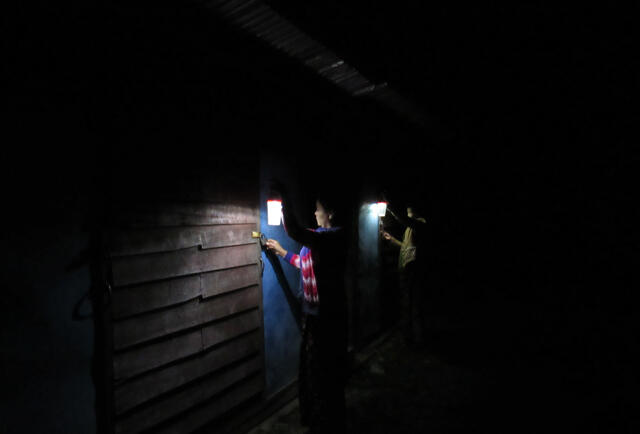Khin Khin shudders when she thinks about walking in the dark from her shelter to the shared toilet: “I never feel safe to go to the toilet at night.”
In Myanmar, 1.5 million people have no toilet in their home or yard. A toilet underpins not only health and dignity, but also safety. Women and girls are at risk of sexual assault and harassment when they have to relieve themselves and manage their menstrual hygiene in shared facilities or in the open. They experience fear and brutality. Women and girls in urban slums, in rural areas and in refugee camps are most at risk.
“There is no light on the way to the toilet”
Khin Khin lives in the Hkat Cho camp for internally displaced people in Waingmaw, in Myanmar’s Kachin State. She has lived in a temporary shelter for six years, since armed conflict reached her village and she had to flee with her children. At 38, she is a widow and the mother of two children aged 10 and 14.
“The toilets are about 100 yards from the camp itself. There are also bushes on the way. We don’t have electricity in the camp, and there is no light on the way to the toilet. We never feel safe, especially not at night,” says Khin Khin.
“I had a small torchlight with a battery, but most of the time I could not afford to buy a battery. Sometimes I used a candle, but the wind and rain would often put it out.”
Solar lanterns reduce the risks
©Metta Development Foundation/Hkawng Nan
The lack of toilets and how it puts women at risk of violence is a topic that is often shrouded in silence. Yet the connection is evidenced time again. In the camps for displaced people in Myanmar, women and girls know the risks and the fear all too well.
To reduce the risk of violence against women and girls who have to walk to shared toilet facilities at night, UNFPA provides solar-powered lanterns. In collaboration with partners Metta Development Foundation and the Kachin Baptist Convention, nearly 2,500 lanterns have been distributed to women in camps for internally displaced people in Kachin, Myanmar.
“Now I use the solar lantern every time I go to the toilet, no matter the rain or the wind. I can go to toilet anytime I want, and also with the children. I really like that the lamp does not need a battery, so I do not have to worry about the costs”, says Khin Khin.
As part of its humanitarian response, UNFPA also advocates for safer sanitation facilities in camps: Separate toilets for men and women, and toilets that do not require long walks in the dark.


